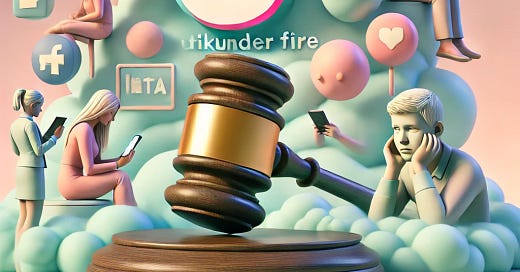TikTok Under Fire: A Dozen States Sue Over Mental Health Impact on Children
This legal challenge comes on top of the existential threat TikTok faces in the U.S. under a federal law.
A Coalition of States Puts TikTok in the Dock
On Tuesday, 8th October, more than a dozen U.S. states, along with the District of Columbia, launched a series of lawsuits against TikTok, accusing the app of endangering children's mental health. These lawsuits, stemming from a national investigation, argue that TikTok’s algorithm and interface are intentionally designed to keep young users engaged for extended periods, resulting in harmful psychological effects. The app, widely popular among youth, has been criticised for its addictive qualities, which the lawsuits claim contribute to mental health issues such as anxiety, depression, and body dysmorphia.
Allegations Against TikTok
At the core of these legal challenges is TikTok’s algorithm, which curates the content users see and creates a highly personalised feed that encourages prolonged engagement. The lawsuits claim that features like endless scrolling, frequent notifications, and face filters are designed to exploit dopamine-driven behaviour, making it difficult for young users to stop interacting with the app. The District of Columbia, in particular, has criticised TikTok for deliberately ignoring the long-term mental health risks, mirroring broader concerns about the negative effects of social media on children and teens.
TikTok’s Defence
TikTok has rejected these accusations, asserting that it is committed to the safety and well-being of its users, especially teenagers. The company pointed to the steps it has taken to limit younger users’ access, such as prohibiting children under 13 from using its main app and restricting certain content for those under 18. Despite these measures, the lawsuits claim that these safeguards are easily bypassed, enabling minors to access content that could harm their mental health. TikTok has also expressed frustration at the lawsuits, stating that they have worked with authorities for over two years to address concerns and improve their platform.
Broader Legal Challenges
The lawsuits go beyond mental health, accusing TikTok of facilitating the exploitation of minors through its "LIVE" streaming feature, where users can send virtual gifts bought with real money to streamers. The lawsuits claim that this has effectively turned the app into a "virtual strip club," allowing minors to be exploited for sexually explicit content. Additionally, TikTok is being accused of running an unlicensed virtual economy, profiting from these transactions without proper regulatory oversight.
National Security Concerns: The Threat of a U.S. Ban
Aside from these lawsuits, TikTok faces an even more significant challenge: a potential nationwide ban in the United States. In April 2024, the U.S. Congress passed the "Protecting Americans' Data From Foreign Adversaries Act," requiring ByteDance, TikTok's Chinese parent company, to divest its stake in the app by January 15, 2025, or face a U.S. ban. This law is part of a larger effort to reduce foreign influence over digital platforms operating in the U.S. Lawmakers fear that TikTok’s connection to China could enable the Chinese government to exploit user data or manipulate the app’s content, posing a national security threat.
Legal Battle Over the Constitutionality of the Law
In response, TikTok and ByteDance have filed a lawsuit challenging the constitutionality of the law. The case, currently before the U.S. Court of Appeals for the District of Columbia Circuit, focuses on whether the law violates the First Amendment rights of TikTok's 170 million U.S. users by restricting their access to the platform. The U.S. government contends that the law is essential for protecting national security, citing the risk of user data being accessed by the Chinese government. Oral arguments took place in September 2024, with a decision expected by December. Both TikTok and the Justice Department have requested a ruling by December 6, 2024.
This timeline would allow for potential appeals to the full federal appeals court and, ultimately, to the U.S. Supreme Court before the January 19, 2025, deadline. The outcome of this case could have far-reaching consequences, not just for TikTok, but for the broader issue of foreign ownership of digital platforms in the U.S.
Summing Up
As TikTok faces multiple legal battles, the platform is at the heart of an ongoing debate about the responsibilities of social media companies, particularly when it comes to protecting children. While TikTok insists that it has made efforts to safeguard its young users, the allegations brought by multiple states highlight the need for greater accountability in the tech industry. Whether these lawsuits will lead to significant changes in the way social media operates is yet to be determined, but the stakes are undeniably high for both TikTok and its millions of users.




